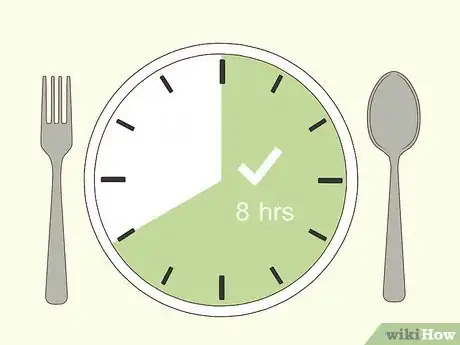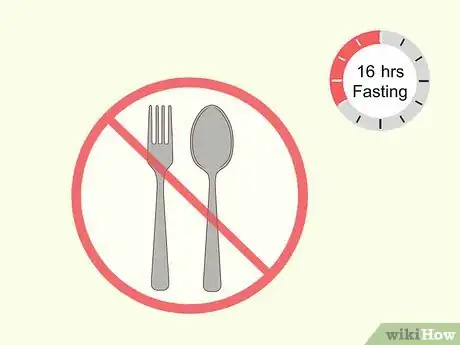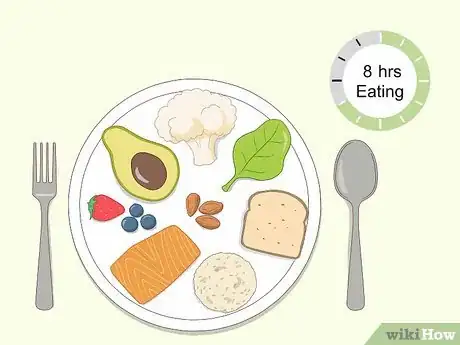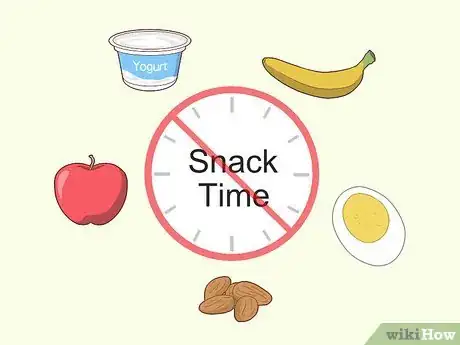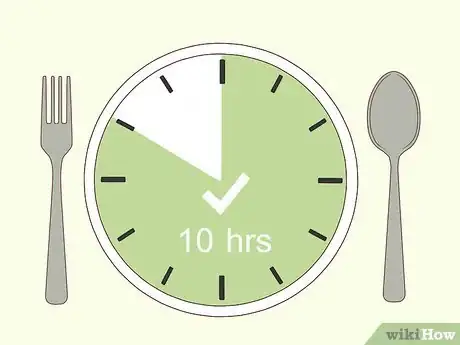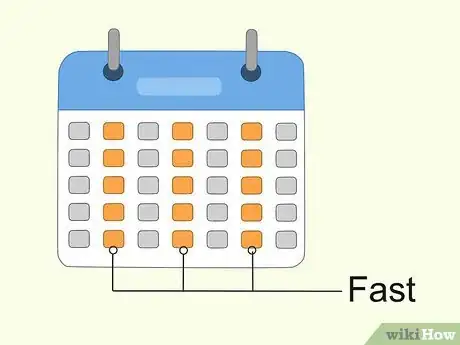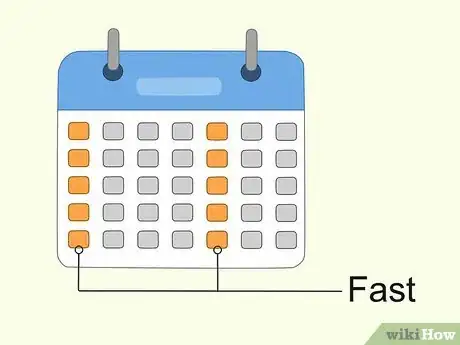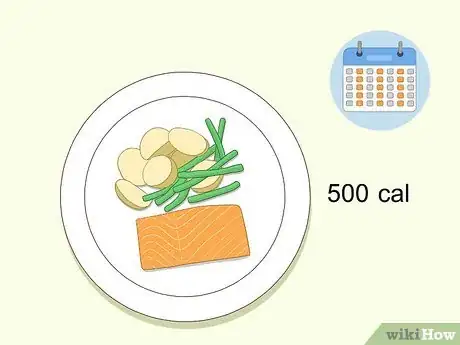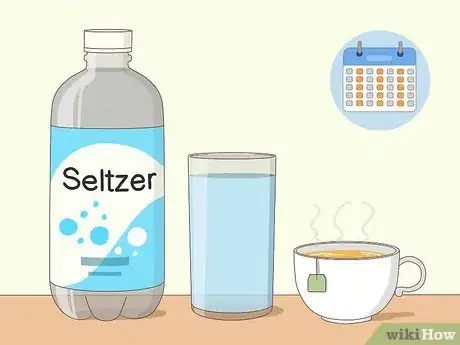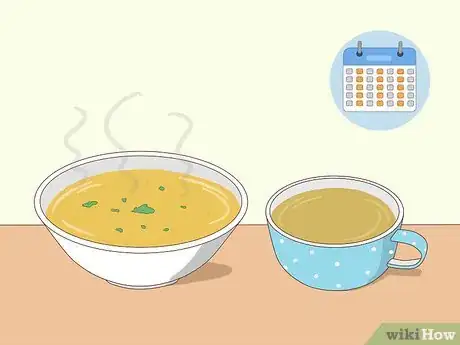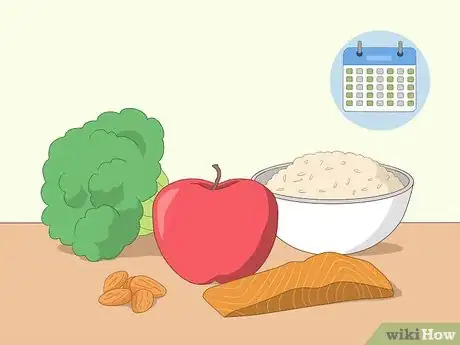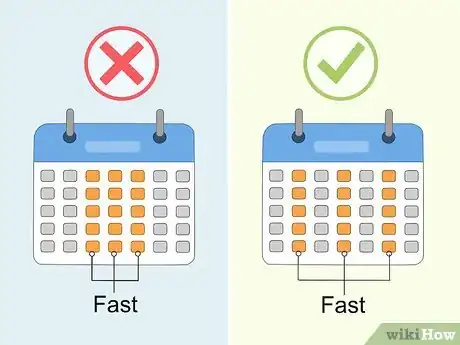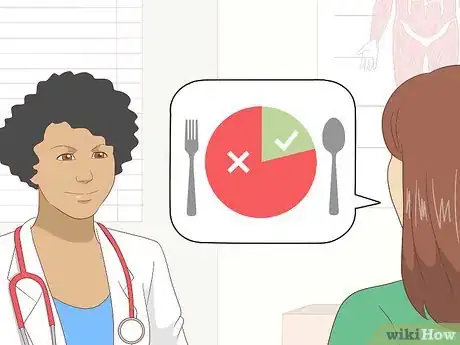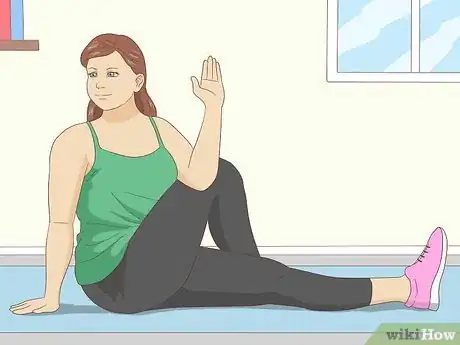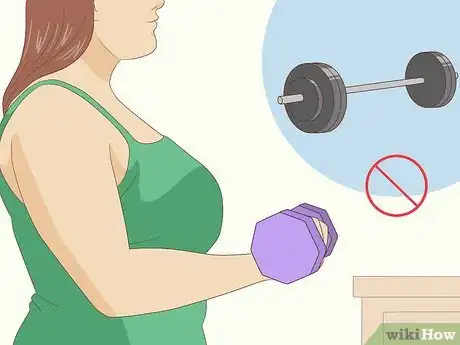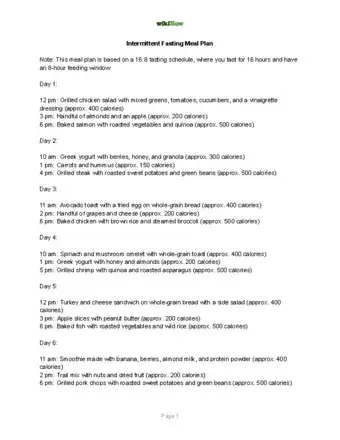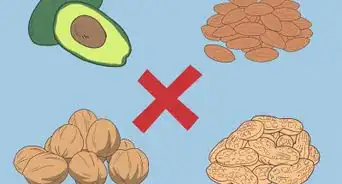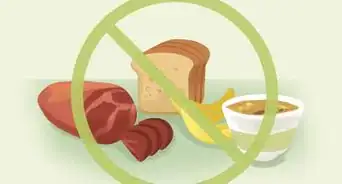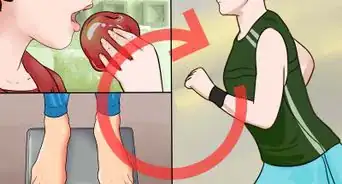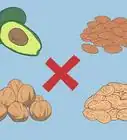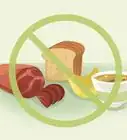This article was co-authored by Olivia Mitchell, RDN, IFNCP. Olivia Mitchell is an Integrative and Functional Nutrition Certified Practitioner (IFNCP™) and a Registered Dietitian Nutritionist (RDN) with a focus on women's hormones and fertility. Olivia has her virtual practice where she helps her clients dive deeper into often overlooked causes of infertility with a customized diet, lifestyle, and supplement changes. She is also the co-founder of the Natalwork and Lead Nutrition Coach with On The Goga. Olivia received her Bachelor’s degree in Nutrition Sciences from West Chester University of Pennsylvania and her RDN from The University of Houston.
There are 12 references cited in this article, which can be found at the bottom of the page.
This article has been viewed 16,252 times.
Intermittent fasting, a dietary plan that restricts when you can eat, is a popular trend that supporters claim helps you lose weight and perform to your full potential. But does it actually work? While it might not be the magic cure that some proponents make it sound like, studies do show that intermittent fasting can be an effective weight-loss tool. If you’d like to try it out for yourself, then you have a few choices for which plan to follow. Despite what you may have heard, intermittent fasting is actually easier than you might think. Just check with your doctor to make sure this is right for you, then you can get started!
Steps
16:8 Intermittent Fasting
-
1Pick an 8-hour window that you'll eat during the day. On a 16:8 schedule, you'll eat during 8 hours throughout the day and fast for the other 16. Many people find this to be the easiest way to practice intermittent fasting because it's easy to stick with. Start by picking your 8-hour eating window. For most people, this is from the late morning to evening.[1]
- 11 AM to 7 PM is a popular window, but pick the one that works for you. Try to time it so you eat at the times you're most hungry.
- With time-restricted fasting, you can follow a fasting schedule every day or only a few days per week. Since you're trying to lose weight, it's best to do it more often, at least a few days a week.
- Some people will skip breakfast and have a small eating window between lunch and dinner.[2]
-
2Fast during the 16 hours outside your eating window. Don't eat before or after your fasting window, or you'll ruin the fast. This might be tough for a few days while you're getting used to fasting, but you'll get accustomed to it. Fasting will get a lot easier before too long.[3]Advertisement
-
3Follow a healthy, balanced diet during your eating window. For the best weight-loss results, doctors recommend that you have healthy foods during your eating windows. Include plenty of fresh fruits, vegetables, whole grains, healthy fats, and lean proteins in your diet to help support your weight-loss goals.[6]
- Also avoid unhealthy foods like fatty, processed, sugary, or fried meals.
- It's best to follow a healthy diet on days you aren't fasting too. A consistent, healthy diet is best for your health.[7]
-
4Avoid snacking between meals and at night. Snacking keeps your insulin levels up and prevents your body from burning fat. This can sabotage your weight-loss goals and fasting plan. As much as you can, eat only during your mealtimes and skip the snacks through the day and at night.[8]
-
5Change your window to 14:10 if you feel too hungry. If you're not used to fasting, then a 16:8 schedule might seem tough. In this case, you can dial it back to a 14:10 schedule instead.[9] These 2 extra eating hours could make it easier to get through the early fasting period.
- You could try jumping back to a 16:8 schedule if you want to, or stick with a 14:10 instead.
- A popular schedule for a 14:10 schedule is eating between 10 AM and 8 PM and fasting for the rest of the day, but again, this depends on you.
Full-Day Intermittent Fasting
-
1Choose alternate-day fasting for the best weight-loss results. Alternate-day fasting means that you’ll fast on alternating days and eat normally on other days. Studies show that this fasting type leads to the most weight-loss because you're reducing your overall calories by a pretty high margin. It’s a good choice if you need to lose weight quickly and keep it off.[10]
- With this plan, on a normal week you’d eat on Sunday, Tuesday, Thursday, and Saturday, and fast on Monday, Wednesday, and Friday. Simply alternate days to stick to the plan.
- This fasting type is about as effective as a regular, low-calorie diet. This means that if you want to, you could also just reduce your overall eating for similar results.
-
2Pick 5:2 fasting for a less extreme choice. On the 5:2 plan, you’ll eat normally 5 days per week and fast on 2 of them. This is a less demanding plan than alternate-day fasting, so you might find it easier to start off with.[11]
- With this plan, you could fast on Sunday and Thursday, while eating normally on Monday, Tuesday, Wednesday, Friday, and Saturday.
- You can always adjust your plan and start alternate-day fasting when you get used to fasting.
-
3Limit yourself to 500 calories on fasting days. You actually can eat on days that you’re fasting, just not a lot. Stick with 1 or 2 small meals that total no more than 500 calories. This keeps your body in fat-burning mode.[12]
- This only counts for alternate-day or 5:2 fasting plans. If you’re doing time-restricted fasting, then you can’t eat at all during the fast period.
-
4Drink plenty of zero-calorie beverages when you’re fasting. Fasting definitely doesn’t mean you aren’t allowed to drink. In fact, you should drink more than usual during your fasting periods so you don’t get dehydrated. Drinks without calories, like water, seltzer, black coffee, and tea, are all allowed. Stick with these so you don’t add any calories during your fast.[13]
- Avoid juices, soda, and other drinks that contain sugar and calories.
- Remember not to add any milk or sugar to your coffee and tea. This adds calories to the drink.
-
5Have plain broths if you need something else during your fast. It’s okay to have very low-calorie liquid meals while you’re fasting. Vegetable, chicken, and bone broths are good for a little boost if you need it.[14]
-
6Eat healthy foods when you break your fast. You’ll probably be tempted to eat a lot when your fasts end, but fight the temptation so you don't undo all your progress. Stick with healthy meals to satisfy your hunger while still losing weight.[15]
- The exact time that you can break your fast depends on which plan you're using. For time-restricted plans, you usually can't eat until the later morning. For full-day plans, you can usually eat when you wake up on the morning of your non-fast day.[16]
- It’s best to follow a healthy diet rich in fresh fruits, vegetables, whole grains, healthy fats, and lean proteins every day. This will support your weight-loss goals much better than fasting alone. Doctors usually recommend the Mediterranean diet as a guide for ideal weight-loss.[17]
- For better weight-loss results, plan to cut 500 calories each day form your normal diet as well. If you normally eat 2,000 calories per day, then plan to eat 1,500 on your eating days. This helps reduce your overall calories.[18]
-
7Stay safe by leaving at least 24 hours in between your fasting days. No matter what plan you use, never fast for multiple days in a row. This is dangerous and you could end up malnourished. Always schedule at least 24 hours between your fasting days to avoid any negative side effects.[19]
- Fasting for multiple days in a row could actually sabotage your weight-loss goals. Your body might start storing fat instead of burning it to save energy.
- This same rule doesn't apply to time-restricted fasting. Since you're only limiting yourself for a few hours at a time, it's safe to fast this way multiple days in a row.
Maximizing Your Weight-Loss
-
1Ask your doctor before trying any new diets. While intermittent fasting is less extreme than many other diets, there could still be health risks if you suddenly switch to a restricted diet. Always check with your doctor first to make sure this is safe for you, and follow any of their suggestions for fasting correctly.[20]
- Your doctor may tell you not to try fasting if you’re pregnant or diabetic, have had an eating disorder in the past, take medications that require food, or are in an active growth period like adolescence.[21]
- If your doctor tells you not to fast, then listen to them. Talk about other healthy weight-loss methods instead.
- Don't try an intermittent fasting diet if you're pregnant or trying to get pregnant. This diet can be very hard on your hormones, including fertility-related ones.[22]
-
2Stay active throughout the day. Even when you’re fasting, you still need exercise to lose weight and stay healthy. In fact, your weight-loss program will almost definitely work better if you stay active. Try getting some exercise each day to support your goals.[23]
- If you’re exercising on a fast day, it’s best to do it near the end of the fast. This burns the most fat and prepares your muscles to absorb nutrients when you eat.[24]
-
3Stick with moderate exercise while you're fasting. While exercising while you're fasting is fine, and even good for you, you need to be careful. Avoid high-intensity workouts like HIIT training or heavy powerlifting. Your body won't have enough nutrients to perform or recover properly, so you could get hurt if you push too far. Stick with moderate exercises on fasting days for the best results.[25]
- No matter what exercises you do, your performance will probably fall on fasting days. This is normal.
- If you're an athlete and regularly work out intensely, then fasting may not be right for you. Ask your doctor first.
Intermittent Fasting Meal Plan
Expert Q&A
-
QuestionCan I do intermittent fasting while pregnant?
 Olivia Mitchell, RDN, IFNCPOlivia Mitchell is an Integrative and Functional Nutrition Certified Practitioner (IFNCP™) and a Registered Dietitian Nutritionist (RDN) with a focus on women's hormones and fertility. Olivia has her virtual practice where she helps her clients dive deeper into often overlooked causes of infertility with a customized diet, lifestyle, and supplement changes. She is also the co-founder of the Natalwork and Lead Nutrition Coach with On The Goga. Olivia received her Bachelor’s degree in Nutrition Sciences from West Chester University of Pennsylvania and her RDN from The University of Houston.
Olivia Mitchell, RDN, IFNCPOlivia Mitchell is an Integrative and Functional Nutrition Certified Practitioner (IFNCP™) and a Registered Dietitian Nutritionist (RDN) with a focus on women's hormones and fertility. Olivia has her virtual practice where she helps her clients dive deeper into often overlooked causes of infertility with a customized diet, lifestyle, and supplement changes. She is also the co-founder of the Natalwork and Lead Nutrition Coach with On The Goga. Olivia received her Bachelor’s degree in Nutrition Sciences from West Chester University of Pennsylvania and her RDN from The University of Houston.
Integrative & Functional Nutrition Certified Practitioner No, this isn't a good idea. Intermittent fasting will be very hard on your hormones—specifically your thyroid—as well as other fertility-related hormones, like cortisol and insulin.
No, this isn't a good idea. Intermittent fasting will be very hard on your hormones—specifically your thyroid—as well as other fertility-related hormones, like cortisol and insulin. -
QuestionWhich intermittent fasting is best for weight loss?
 Olivia Mitchell, RDN, IFNCPOlivia Mitchell is an Integrative and Functional Nutrition Certified Practitioner (IFNCP™) and a Registered Dietitian Nutritionist (RDN) with a focus on women's hormones and fertility. Olivia has her virtual practice where she helps her clients dive deeper into often overlooked causes of infertility with a customized diet, lifestyle, and supplement changes. She is also the co-founder of the Natalwork and Lead Nutrition Coach with On The Goga. Olivia received her Bachelor’s degree in Nutrition Sciences from West Chester University of Pennsylvania and her RDN from The University of Houston.
Olivia Mitchell, RDN, IFNCPOlivia Mitchell is an Integrative and Functional Nutrition Certified Practitioner (IFNCP™) and a Registered Dietitian Nutritionist (RDN) with a focus on women's hormones and fertility. Olivia has her virtual practice where she helps her clients dive deeper into often overlooked causes of infertility with a customized diet, lifestyle, and supplement changes. She is also the co-founder of the Natalwork and Lead Nutrition Coach with On The Goga. Olivia received her Bachelor’s degree in Nutrition Sciences from West Chester University of Pennsylvania and her RDN from The University of Houston.
Integrative & Functional Nutrition Certified Practitioner Intermittent fasting involves a lot of trial and error. Test things out with an 8-10 hour fast, and then build that up to 12-16 hours. This will be the "window" where you aren't eating.
Intermittent fasting involves a lot of trial and error. Test things out with an 8-10 hour fast, and then build that up to 12-16 hours. This will be the "window" where you aren't eating. -
QuestionWhen should I eat during intermittent fasting?
 Olivia Mitchell, RDN, IFNCPOlivia Mitchell is an Integrative and Functional Nutrition Certified Practitioner (IFNCP™) and a Registered Dietitian Nutritionist (RDN) with a focus on women's hormones and fertility. Olivia has her virtual practice where she helps her clients dive deeper into often overlooked causes of infertility with a customized diet, lifestyle, and supplement changes. She is also the co-founder of the Natalwork and Lead Nutrition Coach with On The Goga. Olivia received her Bachelor’s degree in Nutrition Sciences from West Chester University of Pennsylvania and her RDN from The University of Houston.
Olivia Mitchell, RDN, IFNCPOlivia Mitchell is an Integrative and Functional Nutrition Certified Practitioner (IFNCP™) and a Registered Dietitian Nutritionist (RDN) with a focus on women's hormones and fertility. Olivia has her virtual practice where she helps her clients dive deeper into often overlooked causes of infertility with a customized diet, lifestyle, and supplement changes. She is also the co-founder of the Natalwork and Lead Nutrition Coach with On The Goga. Olivia received her Bachelor’s degree in Nutrition Sciences from West Chester University of Pennsylvania and her RDN from The University of Houston.
Integrative & Functional Nutrition Certified Practitioner Some people will skip breakfast and then have a small eating window between and lunch and dinner. Then, they'll fast overnight and through breakfast.
Some people will skip breakfast and then have a small eating window between and lunch and dinner. Then, they'll fast overnight and through breakfast.
Warnings
- If you feel very dizzy or weak while you’re fasting, then stop the fast and eat something.⧼thumbs_response⧽
- Never try to fast without checking with your doctor first.⧼thumbs_response⧽
- While intermittent fasting can help you lose weight in the short-term, its long-term effects aren’t well-known. Stay in contact with your doctor and follow their instructions to stay healthy.[27]⧼thumbs_response⧽
References
- ↑ https://health.clevelandclinic.org/intermittent-fasting-4-different-types-explained/
- ↑ Olivia Mitchell, RDN, IFNCP. Integrative & Functional Nutrition Certified Practitioner. Expert Interview. 22 June 2021.
- ↑ https://health.clevelandclinic.org/intermittent-fasting-4-different-types-explained/
- ↑ https://www.hopkinsmedicine.org/health/wellness-and-prevention/intermittent-fasting-what-is-it-and-how-does-it-work
- ↑ Olivia Mitchell, RDN, IFNCP. Integrative & Functional Nutrition Certified Practitioner. Expert Interview. 22 June 2021.
- ↑ https://www.hopkinsmedicine.org/health/wellness-and-prevention/intermittent-fasting-what-is-it-and-how-does-it-work
- ↑ https://www.health.harvard.edu/blog/intermittent-fasting-surprising-update-2018062914156
- ↑ https://www.amc.edu/academic/gme/upload/February-Intermittent-Fasting.pdf
- ↑ https://health.clevelandclinic.org/intermittent-fasting-4-different-types-explained/
- ↑ https://www.mayoclinic.org/healthy-lifestyle/nutrition-and-healthy-eating/expert-answers/intermittent-fasting/faq-20441303
- ↑ https://www.hopkinsmedicine.org/health/wellness-and-prevention/intermittent-fasting-what-is-it-and-how-does-it-work
- ↑ https://health.clevelandclinic.org/intermittent-fasting-4-different-types-explained/
- ↑ https://www.hopkinsmedicine.org/health/wellness-and-prevention/intermittent-fasting-what-is-it-and-how-does-it-work
- ↑ https://healthblog.uofmhealth.org/wellness-prevention/intermittent-fasting-it-right-for-you
- ↑ https://www.hopkinsmedicine.org/health/wellness-and-prevention/intermittent-fasting-what-is-it-and-how-does-it-work
- ↑ https://health.clevelandclinic.org/intermittent-fasting-4-different-types-explained/
- ↑ https://www.health.harvard.edu/blog/intermittent-fasting-surprising-update-2018062914156
- ↑ https://healthblog.uofmhealth.org/wellness-prevention/intermittent-fasting-it-right-for-you
- ↑ https://www.hopkinsmedicine.org/health/wellness-and-prevention/intermittent-fasting-what-is-it-and-how-does-it-work
- ↑ https://www.piedmont.org/living-better/does-intermittent-fasting-help-you-lose-weight
- ↑ https://www.hsph.harvard.edu/nutritionsource/healthy-weight/diet-reviews/intermittent-fasting/
- ↑ Olivia Mitchell, RDN, IFNCP. Integrative & Functional Nutrition Certified Practitioner. Expert Interview. 22 June 2021.
- ↑ https://healthblog.uofmhealth.org/wellness-prevention/intermittent-fasting-it-right-for-you
- ↑ https://www.womenshealthmag.com/weight-loss/a29000994/intermittent-fasting-working-out/
- ↑ https://www.prospectmedical.com/resources/wellness-center/working-out-while-intermittent-fasting
- ↑ https://newsnetwork.mayoclinic.org/discussion/mayo-clinic-q-and-a-long-term-benefits-and-risks-of-intermittent-fasting-arent-yet-known/
- ↑ https://newsnetwork.mayoclinic.org/discussion/mayo-clinic-q-and-a-long-term-benefits-and-risks-of-intermittent-fasting-arent-yet-known/
